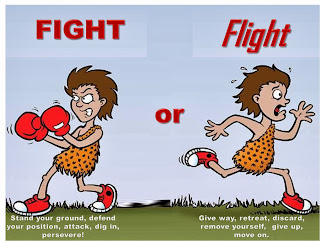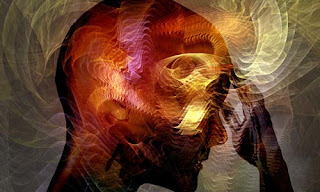Every and all things trigger a response: action ~ reaction.
Pretend that, while walking on an icy road, you slip. What is your reaction, your response? Mostly, we are so caught by surprise that we become stiff. That is followed by a fall. Frequently we land on our hands and, if we are lucky, only hurt ourselves and not broke wrists. If we had a knowledge how to “properly” fall, we would have “let go” and yield ourselves to a fall. Most likely, no harm to our body would be done, we would only get wet. Which we get anyway.
“The grasses abate in the direction the wind blows.” says a Chinese proverb.
Showing posts with label Nature. Show all posts
Showing posts with label Nature. Show all posts
Least of effort in leadership
The Mandarin Chinese word wú wéi could be described: ‘by inaction nothing is left undone.’ It may well be also translated as ‘non-acting makes all action possible.’ Lǎo Zǐ, a philosopher of ancient China and the author of the Dào Dé Jīng, in stanza 38 ‘About Dé of the Dào’ described it as:
High virtue by obliging not acquires moral force.
 Dào is usually translated as way, road, channel, path, doctrine, or line and by Chinese opinion cannot be obtained as virtue cannot be approached. The legendary Chinese sovereign and cultural hero Yellow Emperor (reigned from 2.696–2.598 BE) said that once Dào is lost, virtue arises; once virtue is lost, humaneness arises; once humaneness is lost, righteousness arises; once righteousness is lost, formalism arises. But formalism is the flowery representation of Dào and the beginning of disorder.
Dào is usually translated as way, road, channel, path, doctrine, or line and by Chinese opinion cannot be obtained as virtue cannot be approached. The legendary Chinese sovereign and cultural hero Yellow Emperor (reigned from 2.696–2.598 BE) said that once Dào is lost, virtue arises; once virtue is lost, humaneness arises; once humaneness is lost, righteousness arises; once righteousness is lost, formalism arises. But formalism is the flowery representation of Dào and the beginning of disorder.
High virtue by obliging not acquires moral force.
Low virtue obliges always and thus lacks moral force.
High virtue neither strives nor acts for its own ends.
Low virtue does not strive but acts for its own ends.
 Dào is usually translated as way, road, channel, path, doctrine, or line and by Chinese opinion cannot be obtained as virtue cannot be approached. The legendary Chinese sovereign and cultural hero Yellow Emperor (reigned from 2.696–2.598 BE) said that once Dào is lost, virtue arises; once virtue is lost, humaneness arises; once humaneness is lost, righteousness arises; once righteousness is lost, formalism arises. But formalism is the flowery representation of Dào and the beginning of disorder.
Dào is usually translated as way, road, channel, path, doctrine, or line and by Chinese opinion cannot be obtained as virtue cannot be approached. The legendary Chinese sovereign and cultural hero Yellow Emperor (reigned from 2.696–2.598 BE) said that once Dào is lost, virtue arises; once virtue is lost, humaneness arises; once humaneness is lost, righteousness arises; once righteousness is lost, formalism arises. But formalism is the flowery representation of Dào and the beginning of disorder. Two sides of the same coin
What constitutes to be a superior leader? F. Marcos said: Leadership is the other side of the coin of loneliness, and he who is a leader must always act alone. And acting alone, accept everything alone (brainyquote). So, is it a head or is it a tail?
 My lessons from “the other side of a coin” started when, together with my sons, we decided to go to the Mount Kilimanjaro. My decision had nothing to do with Kilimajaro being the biggest free standing mountain in the world or because it is the tallest mountain of the African continent and not even because it bares my name in it. I joined the idea because it was my long lived dream since the times I lived in Africa.
My lessons from “the other side of a coin” started when, together with my sons, we decided to go to the Mount Kilimanjaro. My decision had nothing to do with Kilimajaro being the biggest free standing mountain in the world or because it is the tallest mountain of the African continent and not even because it bares my name in it. I joined the idea because it was my long lived dream since the times I lived in Africa.
To climb the summit of 5.895 m in eight days via Lemosho route had to be planned well in advance as we were not physically fit for such a challenge. For months prior to the challenge we have been successful at climbing and trekking to each and every hill or mountain available to us in Slovenia. After Kilimanjaro I realize that it was not the trekking of more than 70 km or freezing temperatures that we have underestimated. It was “the other side of a coin.”
High altitude and lack of oxygen proved to be subjected to our naivety in thinking that climbing such a mountain is only a physical challenge. Slow walk, introduced by our guides from the ANDA African Adventure, at the beginning of our tour seemed ridiculous to us, but each succeeding day on the mountain proved that it was the only compulsory physical possibility for success.
 My lessons from “the other side of a coin” started when, together with my sons, we decided to go to the Mount Kilimanjaro. My decision had nothing to do with Kilimajaro being the biggest free standing mountain in the world or because it is the tallest mountain of the African continent and not even because it bares my name in it. I joined the idea because it was my long lived dream since the times I lived in Africa.
My lessons from “the other side of a coin” started when, together with my sons, we decided to go to the Mount Kilimanjaro. My decision had nothing to do with Kilimajaro being the biggest free standing mountain in the world or because it is the tallest mountain of the African continent and not even because it bares my name in it. I joined the idea because it was my long lived dream since the times I lived in Africa.To climb the summit of 5.895 m in eight days via Lemosho route had to be planned well in advance as we were not physically fit for such a challenge. For months prior to the challenge we have been successful at climbing and trekking to each and every hill or mountain available to us in Slovenia. After Kilimanjaro I realize that it was not the trekking of more than 70 km or freezing temperatures that we have underestimated. It was “the other side of a coin.”
High altitude and lack of oxygen proved to be subjected to our naivety in thinking that climbing such a mountain is only a physical challenge. Slow walk, introduced by our guides from the ANDA African Adventure, at the beginning of our tour seemed ridiculous to us, but each succeeding day on the mountain proved that it was the only compulsory physical possibility for success.
Leadership catch: Adjustment and listening
 Imagine walking through the woods. You
carefully move and step slowly on the uneven ground where even the exposed tree
roots are all covered by leaves. We adapt to environment. Although trees might
seem static and unmovable they are still flexible and adaptive. They adjust to
the surrounding environment and therefore become even more stable. They do not
consume extra energy to rise straight up. It is natural for them to adapt to
the floor declination when they grow.
Imagine walking through the woods. You
carefully move and step slowly on the uneven ground where even the exposed tree
roots are all covered by leaves. We adapt to environment. Although trees might
seem static and unmovable they are still flexible and adaptive. They adjust to
the surrounding environment and therefore become even more stable. They do not
consume extra energy to rise straight up. It is natural for them to adapt to
the floor declination when they grow. We all have to adjust to our environment, or
in martial arts to opponent, and to the mistakes you make during the fight. You
can do this only by being flexible. In everyday life there is an abundance of
events and issues that require our adaptation. But are we able to adapt
quickly? How do we know what to do? When someone trips and is just about to
fall, his brain starts to function at high speed. When we are very young or
very drunk, we just let it go and fall down. Kids roll with it or just fall loosely,
and because of this reaction, they are not severely injured most of the time.
What about the rest of us? Our first reaction is violent; we start to
gesticulate wildly with our hands. We start to contradict the obvious that
happens all the same. Most of the time, instead of bending our knees, we stop
our fall with our arms and quite a lot of times break our wrists. We forget how
to fall and do not know how to adjust to this event that has happened to us
many times before in our lives. We react in panic.
We all have to adjust to our environment, or
in martial arts to opponent, and to the mistakes you make during the fight. You
can do this only by being flexible. In everyday life there is an abundance of
events and issues that require our adaptation. But are we able to adapt
quickly? How do we know what to do? When someone trips and is just about to
fall, his brain starts to function at high speed. When we are very young or
very drunk, we just let it go and fall down. Kids roll with it or just fall loosely,
and because of this reaction, they are not severely injured most of the time.
What about the rest of us? Our first reaction is violent; we start to
gesticulate wildly with our hands. We start to contradict the obvious that
happens all the same. Most of the time, instead of bending our knees, we stop
our fall with our arms and quite a lot of times break our wrists. We forget how
to fall and do not know how to adjust to this event that has happened to us
many times before in our lives. We react in panic.Gong Fu (drinking) tea
The traditional way or the Chinese method of
tea making is called gōng fu chá or meaning
“making a tea with great skill or great efforts.” It is
as much about escaping the pressures of life for a few moments as it is about
enjoying every drop of a tea.
 Tea and coffee bear some similarities. The
energizing effect of the coffee bean plant is thought to have been discovered
in
Tea and coffee bear some similarities. The
energizing effect of the coffee bean plant is thought to have been discovered
in Intuition and martial arts
Intuition and/or instinct? One thing two names?
Significant for all living beings or only human? The animals definitely have
instinct. But do they have an intuition as well?
There is a big difference between intuition and
instinct! The latter is embedded in genetic code and therefore an inborn
complex pattern of behavior existing in every species. It should be
distinguished from a reflex - a simple reaction to a specific impulse composed
of learned lessons that are wired in brains and based on chemistry and
electrical signals through synapses - connections that fire when an impulse
comes. And it fires unconsciously.

 Intuition fires the same way as instinct but
supposedly only in human brain. If it is based on the previous knowledge how
come everybody agrees that even a very small child has an intuition? Okay, you
can have a different understanding of the intuition as I do, as there are at
least two avenues of pursuit when dealing with intuition. One is psychological
and the other is spiritual. The spiritual one starts with beliefs, and we are
not going to discuss about those issues here. The other avenue is on the
psychological level. And this one is, in my opinion, more productive. Research
suggest that part of the intuition is that one quickly forms a context using
one’s ‘base of experience’ to draw parallels and turn that nonverbal or tacit
evidence knowledge into decision-making knowledge.
Intuition fires the same way as instinct but
supposedly only in human brain. If it is based on the previous knowledge how
come everybody agrees that even a very small child has an intuition? Okay, you
can have a different understanding of the intuition as I do, as there are at
least two avenues of pursuit when dealing with intuition. One is psychological
and the other is spiritual. The spiritual one starts with beliefs, and we are
not going to discuss about those issues here. The other avenue is on the
psychological level. And this one is, in my opinion, more productive. Research
suggest that part of the intuition is that one quickly forms a context using
one’s ‘base of experience’ to draw parallels and turn that nonverbal or tacit
evidence knowledge into decision-making knowledge.System thinking
Nature
itself is a system with all parts entangled. Systems are like a human body:
they are consisted of parts, and those same parts affect the performance of the
whole. All the parts are interdependent. Just like a team of players during a
game. But the team is not alone. They have the counter-party, there are judges,
there are physical constraints engaged, and also spectators may be present. All
of this forms a system. Times and circumstances may change, but systems tend to
endure. If we don’t understanding this, wrong decisions, sometimes disastrous,
can happen.
Also an
organization is a system – a “living” system that performs by its own “will”. Rather
than focusing on organizational goals and values, the management practice, when
complying with the bureaucratic processes, sets the latter as the ultimate
objective. Systems take on a life of their own and seem immune to common sense.
When members of an organization feel as though, by circumventing established
rules and procedures, they must constantly fight the system, the result can lead
to cynicism, poor ethical climate, or forces them to jump from one urgent
matter to another instead of worrying about important ones.
To trust the Capital?
You will
all remember the oil spill across the Gulf of Mexico
back in April 2010?
The oil
spills are a classical ‘low probability -- high-impact events’ as the one in Santa Barbara , California
If there
are lessons to be learned from those catastrophes, among the first ones are that
“pre-disaster assumptions tend to be dramatically off base” and that “the
worst-case scenarios were downplayed or ignored”.
We could
argue whether this attitude is driving us against all the basic principles of
Nature. Uncontrollably destroying the natural environment and exploitation of
resources beyond recovery are just some of the profit-oriented results. Is such a conduct responsible behaviour to future generations?
Subscribe to:
Posts (Atom)






